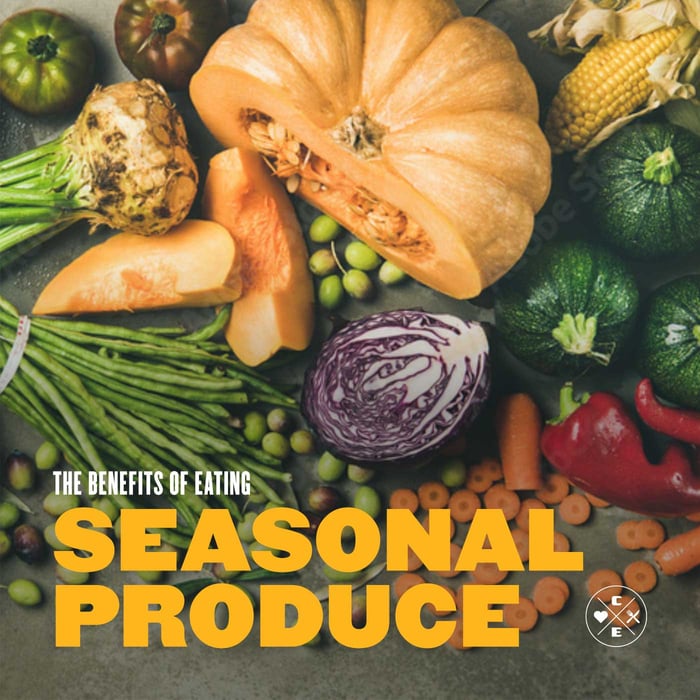The Benefits of Eating Seasonal Produce

Dorothy M. Shirnyl, RND
Nutrition
|
Healthy Recipes
09/30/2024 8:35am
12 minute read
Eating foods that are in season is about enjoying the freshest and most flavorful fruits and vegetables that are grown locally at their peak freshness in your area of the world! It's a way to appreciate the natural cycles of food production in your region.
When you opt for seasonal fruits and vegetables, you're tapping into the bounty of essential vitamins, minerals, and antioxidants that they offer. You'll also uncover an array of flavors that far surpass those found in produce that's been shipped over long distances or artificially ripened.
Not only does choosing seasonal produce enhance your own well-being, but it also contributes to a healthier planet and stronger local communities. By supporting local farmers and reducing the environmental impact of food transportation, seasonal eating becomes a delicious way to make a positive difference.
Let’s explore how prioritizing locally-sourced, peak-season produce can transform your relationship with food and enhance your overall health. Here, we will be tackling about:
- The Nutritional Benefits of Eating Seasonal Produce
- The Environmental Impact of Eating Seasonal Produce
- The Economical Benefits of Eating Seasonal Produce
- The Culinary Advantages of Eating Seasonal Produce
- The Impact of Eating Seasonal Produce on Health and Wellness
The Nutritional Benefits of Eating Seasonal Produce
Ever wonder why a summer tomato tastes so much better than one you buy in winter? Or why those strawberries you pick in the spring are bursting with so much more flavor than the ones you find at the grocery store in December? Let's uncover the hidden nutritional benefits and flavor explosions that come with enjoying produce at its peak.
You Get to Enjoy Higher Nutrient Content
When fruits and vegetables are allowed to ripen naturally on the vine or branch, they develop a greater concentration of vitamins and minerals. This means you're getting the most nutritional bang for your buck! Here's the science behind it:
Peak ripeness = peak nutrition
As seasonal produce is harvested at its peak ripeness, it indicates that it took ample time to soak up nutrients from the soil and sunlight. This translates to higher levels of:
- Vitamin C. A potent antioxidant found in abundance in citrus fruits (like oranges and grapefruits), berries, and leafy greens. Vitamin C boosts immunity, aids in collagen production, and protects against cell damage.
- Vitamin A. Essential for vision, skin health, and a strong immune system. Look for it in brightly colored fruits and vegetables like carrots, sweet potatoes, and mangoes.
- Folate. Crucial for cell growth and development, especially during pregnancy. Leafy greens, asparagus, and avocados are excellent sources of folate.
- Antioxidants. These powerful compounds protect your cells from damage caused by free radicals, which can contribute to chronic diseases. Berries, especially blueberries and raspberries, are antioxidant superstars.
Explore this table to discover which fruits and vegetables are at their peak during each season in North America.
Season | Produce |
Spring | Asparagus, Avocados, Broccoli, Cabbage, Carrots, Celery, Collard Greens, Garlic, Herbs, Kale, Kiwifruit, Lemons, Lettuce, Limes, Mushrooms, Onions, Peas, Pineapples, Radishes, Rhubarb, Spinach, Strawberries, Swiss Chard, Turnips |
Summer | Apricots, Avocados, Beets, Bell Peppers, Blackberries, Blueberries, Cantaloupe, Carrots, Celery, Cherries, Corn, Cucumbers, Eggplant, Garlic, Green Beans, Herbs, Honeydew Melon, Lima Beans, Limes, Mangos, Okra, Peaches, Plums, Raspberries, Strawberries, Summer Squash, Tomatillos, Tomatoes, Watermelon, Zucchini |
Fall | Apples (many varieties like Granny Smith, Honeycrisp), Beets, Bell Peppers, Broccoli, Brussels Sprouts, Cabbage, Carrots, Cauliflower, Celery, Collard Greens, Cranberries, Garlic, Ginger, Grapes, Green Beans, Herbs, Kale, Kiwifruit, Lemons, Lettuce, Limes, Mangos, Mushrooms, Onions, Parsnips, Pears, Peas, Pomegranates, Potatoes, Pumpkin, Radishes, Raspberries, Rutabagas, Spinach, Sweet Potatoes & Yams, Swiss Chard, Turnips, Winter Squash |
Winter | Apples (some varieties), Beets, Brussels Sprouts, Cabbage, Carrots, Celery, Collard Greens, Grapefruit, Herbs, Kale, Kiwifruit, Leeks, Lemons, Limes, Onions, Oranges, Parsnips, Pears, Pineapples, Pomegranates, Potatoes, Pumpkin, Rutabagas, Sweet Potatoes & Yams, Swiss Chard, Turnips, Winter Squash |
Shorter storage = more nutrients!
Seasonal produce simply tastes better! Have you ever noticed how a winter strawberry just doesn't compare to the sweetness of a summer one? That's because fruits and vegetables develop their full flavor profiles when grown in their ideal conditions.
Here's why:
- Natural sugars. When fruits ripen naturally, they have time to develop their full sugar content, resulting in a sweeter and more intense flavor.
- Optimal growing conditions. Each season offers unique conditions that influence the taste of produce. For example, cool nights and warm days during the fall enhance the sweetness of apples.
- Freshness factor. Seasonal produce is often consumed soon after harvest. Means that you get to maximize its freshness and flavor.
Here’s a table that compares the qualities of seasonal produce at its peak freshness with those of the same produce obtained out-of-season
Seasonal vs. Out-of-Season Produce
Produce | In-Season Qualities | Out-of-Season Qualities |
Strawberries |
|
|
Peaches |
|
|
Corn |
|
|
Tomatoes |
|
|
Apples |
|
|
The Environmental Impact of Eating Seasonal Produce
Want to know how eating local and seasonal foods can help the planet? A review of recent studies has revealed some interesting findings! Here are the key impacts:
1. Reduced Carbon Footprint
One of the most significant impacts of eating seasonally is reducing your carbon footprint. Your carbon footprint is the amount of greenhouse gases—like carbon dioxide—released into the atmosphere due to your activities, including the food you eat.
When you choose fruits and vegetables that are in season, you're often supporting local farmers who grow food in sync with the natural environment. This means less energy is needed to get that food to your plate. Here's how:
- Lower Transportation Emissions. Seasonal produce is often grown locally, reducing the distance it needs to travel from farm to table. This translates to lower greenhouse gas emissions associated with transportation, as fewer trucks, trains, or planes are required for long-distance shipping.
- Less Refrigeration. Out-of-season produce often requires extensive refrigeration during transportation and storage, which consumes significant energy. Seasonal produce, being naturally in sync with the local climate, requires less refrigeration, further reducing energy consumption and emissions.
- Reduced Packaging. Long-distance transportation often necessitates more packaging to protect produce during transit. Eating seasonally can reduce the demand for such packaging, minimizing waste and resource depletion.
2. Sustainable Agriculture Practices
Beyond reducing your carbon footprint, eating seasonally actively promotes sustainable agriculture practices. This means supporting a way of farming that is better for the environment and helps protect our planet's resources. Here's how it works:
- Promotes Local and Diverse Farming: When you eat seasonally, you support local farmers who grow a variety of crops that thrive naturally in the local climate. This encourages biodiversity and reduces our reliance on monoculture farming (growing only one type of crop), which can be more susceptible to pests and diseases.
- Less Reliance on Artificial Inputs: Seasonal produce, grown in its natural environment, typically requires fewer artificial ripening agents, pesticides, and preservatives. This contributes to a healthier ecosystem and reduces the negative impacts associated with chemical use in agriculture.
- Preservation of Local Ecosystems: Seasonal eating helps preserve local landscapes and wildlife habitats. By supporting local farmers, it discourages the conversion of natural habitats into farmland and reduces the environmental footprint associated with expanding agricultural land.
3. Other Environmental Benefits
- Improved Soil Health and Water Quality. Seasonal agriculture often involves practices that promote soil health and protect water quality. Crop rotation, cover cropping, and reduced chemical use are common in seasonal farming, leading to improved soil fertility and reduced water pollution.
- Reduced Food Waste. Seasonal eating encourages the consumption of fresh, readily available produce, which can help reduce food waste. When consumers are more connected to the source of their food and its natural growing cycles, they are more likely to appreciate and utilize it efficiently.
The Economical Benefits of Eating Seasonal Produce
Did you know that eating seasonal produce can be a smart choice for both your health and your wallet? One of the most appealing aspects of eating seasonally is the potential for significant cost savings and the positive impact it can have on local economies.
1. Cost-Effectiveness
Seasonal fruits and vegetables are often cheaper due to their abundance and reduced transportation and storage costs. When crops are in peak season, the supply is high, and farmers need to sell their produce quickly, which can lead to lower prices for consumers.
Tips for budgeting with seasonal produce:
- Shop at local farmers' markets.
- Preserve seasonal produce through canning, freezing, or drying.
- Plan your meals around what's in season.
- Join a Community Supported Agriculture (CSA) program.
2. Supporting Local Economies
When you buy local, seasonal produce, you directly support local farmers and communities, contributing to the economic vitality of your region. This helps create jobs and keeps money circulating within your community.
Local markets and farm-to-table initiatives offer excellent opportunities to connect with local farmers and access fresh, seasonal produce. These initiatives also promote sustainable agriculture practices and strengthen community bonds.
The Culinary Advantages of Eating Seasonal Produce
Beyond the environmental and economic benefits, eating seasonal produce offers a range of culinary advantages. Let's explore how seasonal eating can enhance your cooking and connect you with culinary traditions.
Variety and Creativity
Eating seasonally encourages culinary exploration and creativity in the kitchen. As different fruits and vegetables come into season, you'll have the opportunity to experiment with new flavors, textures, and recipes. This can help expand your palate and add excitement to your meals. Here’s some suggestions for seasonal meal planning and cooking tips:
- Explore seasonal cookbooks and online resources for recipe inspiration.
- Visit local farmers' markets to discover new and interesting produce.
- Plan your meals around what's in season to maximize freshness and flavor.
- Try different cooking methods to highlight the unique qualities of seasonal produce.
- Preserve seasonal flavors through canning, freezing, or drying.
Preserving Tradition
Seasonal eating has deep cultural significance in many cuisines around the world. Traditional recipes often feature seasonal ingredients, reflecting the connection between food and cultural heritage. By embracing seasonal eating, you can connect with these traditions and celebrate the cultural richness of food.
Examples of traditional recipes tied to seasonal produce:
- Spring: Asparagus risotto, strawberry shortcake, nettle soup
- Summer: Gazpacho, tomato sandwiches, corn on the cob
- Autumn: Pumpkin pie, apple cider, butternut squash soup
- Winter: Roasted root vegetables, hearty stews, citrus salads
The Impact of Eating Seasonal Produce on Health and Wellness
We've explored the environmental and economic benefits of eating seasonal produce, but the advantages don't stop there. Eating with the seasons can also have a profound impact on your health and well-being. Let's explore the health and wellness benefits of enjoying produce in its natural season.
1. It Connects You to Nature
Eating seasonally offers a unique opportunity to connect with the natural world. By aligning your diet with the rhythms of the seasons, you become more attuned to the cycles of nature and the abundance of fresh produce available at different times of the year.
This connection to nature can have profound mental and emotional benefits that can help in reducing stress and promoting a sense of grounding.
2. It Encourages Participation in Local Food Events and Seasonal Festivals
Participating in local food events and seasonal festivals can further enhance this connection to nature. These events offer a chance to celebrate the harvest, learn about local food traditions, and connect with farmers and food producers in your community.
3. It Promotes Mindful Eating
Seasonal eating naturally promotes mindfulness and a more intentional approach to food. By savoring the flavors of fresh, seasonal produce, you become more present and aware of your food choices. This can lead to a greater appreciation for food and a healthier relationship with eating. Here are some tips for practicing mindful eating with seasonal produce:
- Engage your senses by noticing the vibrant colors, unique textures, and enticing aromas of your food.
- Savor each bite by chewing slowly and paying attention to the flavors and sensations in your mouth.
- Minimize distractions by eating in a calm environment, free from distractions like phones or television.
- Express gratitude for the food and the people who grew and prepared it.
- Listen to your body by paying attention to your hunger and fullness cues.
- Start with a small portion and appreciate the flavors more fully.
- Try a new seasonal recipe and appreciate the diversity of seasonal produce.
- Shop at a local farmers' market and connect with the people who grow your food.
- Grow your own food and connect with the natural cycles of food production.
- Reflect on your experience and what you noticed about the flavors and textures.
Enjoy the Benefits of Eating Seasonal Produce!
Consuming foods that are, in season brings advantages to your well being and the environment where you live in addition, to supporting farmers who follow sustainable practices and providing your body with necessary vitamins and minerals.
Savor the Season, Savor the Benefits!
Experience the pleasure of eating with the seasons ! Head to your farmers market to explore recipes that highlight the variety of flavors that nature provides us with during different times of the year.
Related Articles
The Best Vegetables for Your Health
5 minute read
Peptides: What They Are & Why People Inject Them
5 minute read



